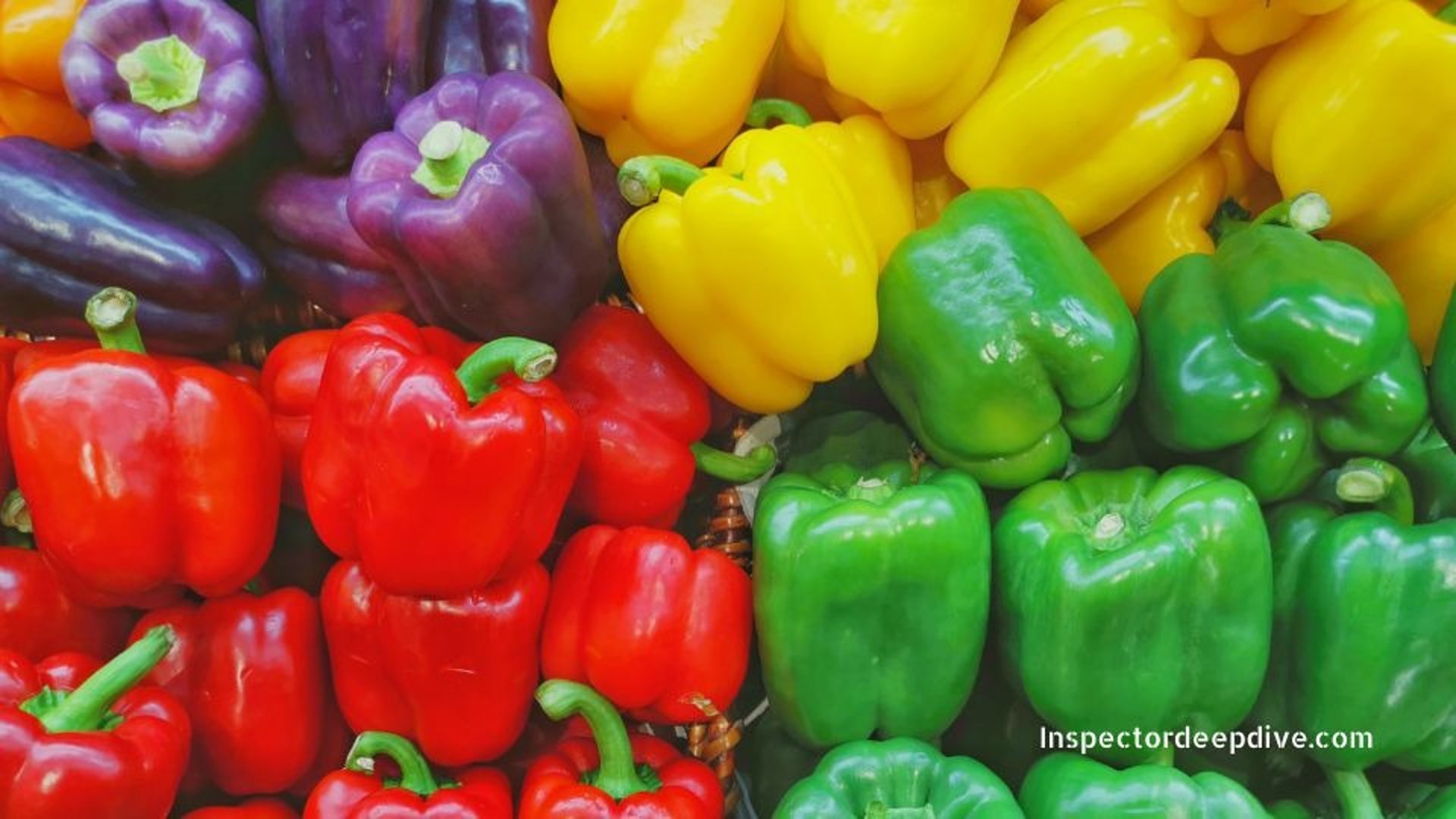
Bell Peppers Nutrition Benefits: Vitamin C Powerhouse for Immunity and Skin Health

Bell Peppers Nutrition Benefits: Vitamin C Powerhouse for Immunity and Skin Health
Scientific Name: Capsicum annuum
Family: Solanaceae (Nightshade family).
What They Are ?
Bell peppers are a type of sweet pepper known for their crisp texture and mild flavor. They come in various vibrant colors, including green, red, yellow, and orange, and are widely used in cooking.
Origin and Varieties
Bell peppers originated in Central and South America, where they have been cultivated for over 9,000 years. Spanish and Portuguese explorers introduced them to Europe, and they are now grown globally.
There are several varieties, primarily distinguished by color: green, red, yellow, and orange. Red bell peppers are simply fully ripened green peppers and tend to be sweeter. Each color offers slightly different flavors and nutritional profiles.
Seasonality & Availability
Bell peppers are typically in season during the summer and early fall. However, due to extensive greenhouse farming, they are available year-round in most regions.
Key Benefits
Rich in Vitamins: Excellent source of vitamins A, C, and E, which support vision, immune function, and skin health.
High in Antioxidants: Packed with carotenoids and flavonoids that protect cells from oxidative stress.
Heart Health: Promotes healthy cholesterol levels and helps reduce inflammation, supporting cardiovascular well-being.
Weight Management: Low in calories and high in fiber, aiding in healthy weight management.
The Anti-Factors
Anti-inflammatory: Contains flavonoids and vitamin C, which help reduce inflammation in the body.
Antioxidant: Neutralizes free radicals, protecting against cellular damage.
Anti-cancer: Carotenoids in bell peppers may help prevent certain cancers, particularly lung and prostate cancer.
Anti-bacterial: Exhibits mild antimicrobial properties effective against certain pathogens.
Anti-hypertensive: Helps lower blood pressure by promoting vasodilation (widening of blood vessels) and improving circulation.
Nutritional Breakdown (per 50g cooked, approx)
Macronutrients
Calories: 12 kcal — low-calorie content, ideal for light meals or snacks.
Water: 42 g — contributes to hydration and supports cellular function.
Protein: 0.5 g — provides essential amino acids for muscle repair.
Total Fat: 0.1 g — mostly unsaturated fats, minimal contribution to daily intake.
Carbohydrates: 2.5 g — includes natural sugars and dietary fiber.
Dietary Fiber: 0.9 g — promotes digestive health and satiety.
Sugars: 1.3 g — naturally occurring sugars like glucose and fructose.
Vitamins
Vitamin A: 200 IU — supports vision and immune function (increased bioavailability when cooked).
Vitamin C: 30 mg — supports immune function and collagen production (with about 25-30% loss from cooking).
Vitamin E: 0.8 mg — essential for skin health and antioxidant protection (slightly increased availability when cooked).
Folate (B9): 7 µg — aids cell division and is important during pregnancy (with about 10-15% loss from cooking).
Minerals
Potassium: 120 mg — regulates fluid balance and supports heart health (improved bioavailability when cooked).
Calcium: 4 mg — promotes strong bones and teeth (better absorption when cooked).
Iron: 0.2 mg — aids oxygen transport in the blood (enhanced absorption when cooked).
Magnesium: 6 mg — involved in energy production and muscle function (slightly improved when cooked).
Zinc: 0.07 mg — supports immune function and wound healing (better availability when cooked).
What Bell Peppers Do to Body
Bell peppers actively transform your health at the cellular level. Their extraordinary vitamin C content (often more than oranges) doesn't merely support immunity: it supercharges your body's ability to produce collagen, the essential protein that keeps your skin firm, joints flexible, and blood vessels strong. This vitamin also regenerates other antioxidants in your body, creating a cascade of protective effects.
The vitamin A content doesn't just support vision; it maintains healthy mucous membranes throughout your respiratory and digestive tracts, creating barriers against infections while supporting immune cell function.
Bell pepper's carotenoids don't merely provide color; they actively protect your cells from oxidative stress, potentially reducing cancer risk and slowing the aging process. These compounds work synergistically to neutralize free radicals that contribute to chronic diseases.
The fiber content supports digestive health by feeding beneficial gut bacteria that produce essential nutrients and communicate directly with your immune system.
Potassium actively helps regulate blood pressure by counteracting sodium effects and supporting proper muscle contractions, including your heart muscle.
Regular consumption may enhance cognitive function through improved blood flow and provide comprehensive protection against chronic diseases while maintaining optimal cellular function and energy production.
Risks and Cautions
Solanine: Raw bell peppers contain small amounts of solanine, which can cause digestive discomfort in sensitive individuals if consumed in large quantities. Cooking significantly reduces these compounds.
Blood Thinners: High vitamin C content may potentially interfere with blood-thinning medications like warfarin.
Diuretics: The potassium content in bell peppers could interact with diuretics or blood pressure medications.
Digestive Enzyme Supplements: The fiber in bell peppers may cause bloating when combined with enzyme supplements.
Who Should Be Cautious?
Individuals on blood thinners or with kidney conditions should moderate their intake. Those prone to digestive issues may need to cook bell peppers thoroughly to improve digestibility.
Surprising Truths
Red bell peppers contain more than twice the amount of vitamin C compared to green bell peppers due to their extended ripening process.
Despite their sweet flavor, they are technically fruits, not vegetables.
Environmental Impact
Bell peppers are relatively easy to grow and require moderate water, making them an environmentally friendly crop. However, pesticide use in conventional farming can harm soil and water systems, so organic options are beneficial.
Best Ways to Use Them
Bell peppers can be eaten raw, roasted, grilled, or stuffed. They pair well with savory dishes like stir-fries, salads, and casseroles. Removing seeds and membranes before cooking enhances their sweetness.
Best Time to Eat
Bell peppers are best enjoyed during their peak season in summer and early fall when they are freshest and most flavorful.
Storage & Shelf Life
Store bell peppers in a plastic bag in the refrigerator to maintain freshness. They can last up to one week but should be used promptly to avoid wilting.
Label Reading Tips
Look for firm, glossy peppers without soft spots or wrinkles. Organic labels indicate reduced pesticide use, which is beneficial for sensitive individuals.
Chef or Culinary Tips
Roast bell peppers to bring out their natural sweetness and enhance their flavor.
Pair with olive oil, garlic, or herbs like basil and oregano for added depth.
For a smoky flavor, char bell peppers directly over a flame or under a broiler until the skin is blackened, then peel and use.
Recipes or Meal Ideas
Stuffed Bell Peppers with Quinoa and Vegetables
Roasted Bell Pepper and Tomato Soup
Bell Pepper Stir-Fry with Chicken and Broccoli
Grilled Bell Peppers with Balsamic Glaze
Bell Pepper and Avocado Salad with Lemon Dressing
The Science Behind It
Bell peppers’ antioxidants and carotenoids play key roles in reducing inflammation and supporting cardiovascular health. Research highlights their role in eye health and cancer prevention.
2025 Scientific Breakthroughs
Recent research has revealed that capsicum compounds may enhance cognitive function and memory formation through improved blood flow to the brain. Studies in 2024-2025 show potential for capsicum extracts in supporting gut microbiome diversity and reducing inflammatory bowel markers. Emerging evidence suggests capsicum antioxidants may play a role in protecting against age-related macular degeneration and supporting retinal health. New findings indicate that regular capsicum consumption may help regulate blood sugar levels and improve insulin sensitivity in prediabetic individuals.
Frequently Asked Questions
Are bell peppers a superfood? Yes, bell peppers are nutrient-dense and offer numerous health benefits due to their vitamins and antioxidants.
Can you eat bell peppers raw? Raw bell peppers are safe and retain their full nutritional value.
How do you store bell peppers to keep them fresh? Store bell peppers in the refrigerator in a plastic bag to maintain their crispness.
info@inspectordeepdive.com
© 2025 food.InspectorDeepDive.com. All rights reserved. Content may not be copied or republished without permission.
This article is for informational purposes only. InspectorDeepDive.com does not provide medical advice. Always consult a licensed healthcare provider before making dietary or health decisions.
